Datasheet
Year, pagecount:2000, 4 page(s)
Language:English
Downloads:2
Uploaded:March 12, 2020
Size:728 KB
Institution:
-
Comments:
Attachment:-
Download in PDF:Please log in!
Comments
No comments yet. You can be the first!
Most popular documents in this category
Content extract
Source: http://doksi.net The Globalization of Baseball: Reflections of a Sports Writer LEONARD KOPPETr Elsewhere in this volume, the reader can delve into the history and theory of the globalization of baseball. Historical and theoretical analyses of the globalization of baseball create important insights into this phenomenon, but my thoughts on this topic reflect the fact that I am a sports writer and not a historian or a theoretician. I want to focus my observations around the present reality of the globalization of baseball and the near-term future of such globalization. Certain words have double meanings. "Baseball" and "globalization" are two such words. The double meanings of "baseball" are captured in the baseball players lament: "Every time I tell em its a game, the owners tell me its a business. Every time I tell em its a business, they tell me its a game" Baseball is, of course, both a game and a business. Baseball on the field,
between the lines, is a game that remains constant, operating under the rules of the game that apply equally to all players on every baseball diamond. The business of baseball is, however, about presenting the game baseball in order to generate revenue and profit. The business of selling baseball for money has very little relationship to the game itself. The methods of generating revenue from a baseball game do not differ greatly from the methods of making money from selling books, movies, or tickets to a symphony concert. The "globalization of baseball" too has multiple meanings that we need to keep in mind. If the globalization of baseball means expanding the reach and influence of Major League Baseball (MLB) into other parts of the world to generate more revenue for MLB teams, we can see evidence of this type of globalization taking place today. The globalization of MLB follows the pattern of other profit-seeking enterprises reaching out for new customers and sources of
labor and other countries. The globalization of baseball, in this respect, is not a new development in the world of business. * Leonard Koppett has been writing about baseball since the 1940s (his earliest memories include seeing Babe Ruth hit and John McGraw manage) for the New York City newspapers, the San Francisco Bay Area newspapers, and the Sporting News. He is the author of half a dozen baseball books Koppett is the only sportswriter named to the writers wing of both the baseball and basketball Halls of Fame. Source: http://doksi.net INDIANA JOURNAL OF GLOBAL LEGAL STUDIES [Vol. 8:81 But if the globalization of baseball means the growth of MLB to include new franchises outside the United States and Canada, I do not believe that such a development is realistic or will ever happen. MLB will continue to attract players from all over the world, as has been happening for years. The MLB system is, however, so old, entrenched, powerful, and lucrative that global expansion of
franchises beyond the United States and Canada will not occur as long as the best baseball players come to North America to play in the Major Leagues. In addition, the nature of baseball, unlike soccer, does not lend itself well to sporadic events, such as periodic world competitions, or to national teams. One reason baseball resists the kind of global events now common in soccer is that it is the only everyday game. The rhythm of a baseball season depends on the game being played daily and isolated events, such as a "World Cup" for baseball, do not resonate with the baseball rhythm. The second reason why new MLB franchises outside the United States and Canada will not occur involves the interest and role of the media in MLB. Newspapers, such as the New York Times and Washington Post, have historically developed economic interests in baseball teams that rival the interests of the team owners. In the newspaper world, a sporting event today helps sell newspapers tomorrow, and
newspapers today help sell sporting events tomorrow. While this synergy holds true in most major sports, in baseball the dynamic operates almost every day for nearly eight months-from spring training to the World Series. I have never heard of a newspaper encouraging a baseball team that threatens to relocate to move away. The New York Times fought very hard to keep the Brooklyn Dodgers and New York Giants from leaving for California. When the Washington Senators wanted to relocate to Texas, the Washington Postdid not editorialize that such a move would be in the best interests of the franchise. The Post said, "No, no, no. We must keep the Washington Senators" The media and organized sports have a common interest that is set in stone. They feed off each other openly without pretensions. This media-sports synergy is one of the economic forces that has made MLB very powerful for so long. I do not see the forces of globalization breaking the media-sports dynamic in connection
with MLB. A third reason why we will not see MLB franchises outside the United States and Canada involves the problem of size. League competitions in Source: http://doksi.net 20001 THE GLOBALIZATION OF BASEBALL sports require a limited number of teams in order to keep the quality of competition high and the seats filled with fans. Today, MLB is already overextended with too many teams. MLB currently has thirty teams, which is too many. Fans cannot really follow thirty teams So many MLB teams fragment the fan market, and each team gets a smaller level of media attention and fan interest. To believe that MLB could add more franchises in Tokyo, Paris, or Mexico City simply is not realistic, because it would badly overextend the money-making processes of the game of baseball. Adding more teams to MLB would also compound scheduling problems. With so many teams, it is hard even in a 162-game season to develop and sustain real rivalries that would develop with fewer teams playing each
other more frequently. This problem affects all sports, and it has been hurting baseball very badly in the last decade. Traditional scheduling patterns have been disrupted, and these disruptions increase the difficulty of generating solid fan interest, particularly among children. Sports consumers are made during childhood. Very few people become fascinated by sports as adults You have to get them when they are young. Historically, baseball got them young, but it is doubtful whether that is true today. Interestingly, the National Basketball Association (NBA) is taking a different approach to selling basketball. The NBA has aimed promotion at the teenage group-what is called the "MTV approach" to sports promotion. I believe that this strategy will prove self-defeating in the long run for the NBA because teenagers and their tastes are notoriously fickle. The MTV approach to marketing works for the music and movie industries because they always have a steady stream of new
teenagers to influence. In sports, the opposite is true. The appeal of most sports is that the game you loved at age ten is the same game when you turn sixteen and when you become an adult. Sports, especially the everyday game of baseball, require continuity and stability to build sustainable fan bases. Extending MLB teamsbeyond the United States and Canada will prove corrosive to the stability from which baseball has historically profited. I will concede that something like a "World Cup" for baseball, modeled on the World Cup of soccer, could develop over time. Special national baseball teams could be created for a periodic global competition. But such a competition would have little, if any, impact on MLB and the globalization of baseball. A baseball "World Cup" would not replace anything about MLB, Source: http://doksi.net INDIANA JOURNAL OF GLOBAL LEGAL STUDIES [Vol. 8:81 but would simply be something additional. Nor would such a global competition do much
for raising the profile of baseball or the profits of baseball because it would be perceived as a side show subordinate in quality to MLB. Consider how little attention baseball receives as an Olympic sport in the United States. American baseball fans will not get a kick out of proclaiming "we beat the Czech Republic." (The patriotism that arose in American-Soviet clashes in basketball, hockey, and other Olympic sports was a peculiar circumstance created by political conditions that no longer exist.) The creation of a baseball "World Cup" would not, I think, challenge the MLB World Series as the championship series for the best baseball players on the planet. Foreign players will continue to strive to play in the Major Leagues because that is where the best baseball anywhere is played day after day. The globalization of baseball, thus, will not be about exporting franchises to Latin America, Asia, or Europe, but about globalizing the local elements of baseball. MLB
has grown to be the trustee of Americas past time because the stability and continuity of baseball ultimately rested on local support for the local team. The marketing of MLB all over the world attempts to globalize localness by stimulating dozens of local markets in foreign countries for MLB products. With global media and the Internet, you can root for, watch, and follow the Cleveland Indians whether you live in Cleveland, Moscow, Tokyo, or Caracas. Part of globalizing the localness of baseball may involve the mythical neighborhood sandlot developing in other countries that have not yet caught the baseball bug. Former colonies of the British Empire may prove especially fertile given the connection of baseball to cricket. Russia and China may also be huge markets for MLB efforts to hook children on the game as early as possible. To conclude, both the game and business of baseball will continue to spread worldwide, but this globalization will only serve to strengthen rather than weaken
MLB hegemony over professional baseball on this planet
between the lines, is a game that remains constant, operating under the rules of the game that apply equally to all players on every baseball diamond. The business of baseball is, however, about presenting the game baseball in order to generate revenue and profit. The business of selling baseball for money has very little relationship to the game itself. The methods of generating revenue from a baseball game do not differ greatly from the methods of making money from selling books, movies, or tickets to a symphony concert. The "globalization of baseball" too has multiple meanings that we need to keep in mind. If the globalization of baseball means expanding the reach and influence of Major League Baseball (MLB) into other parts of the world to generate more revenue for MLB teams, we can see evidence of this type of globalization taking place today. The globalization of MLB follows the pattern of other profit-seeking enterprises reaching out for new customers and sources of
labor and other countries. The globalization of baseball, in this respect, is not a new development in the world of business. * Leonard Koppett has been writing about baseball since the 1940s (his earliest memories include seeing Babe Ruth hit and John McGraw manage) for the New York City newspapers, the San Francisco Bay Area newspapers, and the Sporting News. He is the author of half a dozen baseball books Koppett is the only sportswriter named to the writers wing of both the baseball and basketball Halls of Fame. Source: http://doksi.net INDIANA JOURNAL OF GLOBAL LEGAL STUDIES [Vol. 8:81 But if the globalization of baseball means the growth of MLB to include new franchises outside the United States and Canada, I do not believe that such a development is realistic or will ever happen. MLB will continue to attract players from all over the world, as has been happening for years. The MLB system is, however, so old, entrenched, powerful, and lucrative that global expansion of
franchises beyond the United States and Canada will not occur as long as the best baseball players come to North America to play in the Major Leagues. In addition, the nature of baseball, unlike soccer, does not lend itself well to sporadic events, such as periodic world competitions, or to national teams. One reason baseball resists the kind of global events now common in soccer is that it is the only everyday game. The rhythm of a baseball season depends on the game being played daily and isolated events, such as a "World Cup" for baseball, do not resonate with the baseball rhythm. The second reason why new MLB franchises outside the United States and Canada will not occur involves the interest and role of the media in MLB. Newspapers, such as the New York Times and Washington Post, have historically developed economic interests in baseball teams that rival the interests of the team owners. In the newspaper world, a sporting event today helps sell newspapers tomorrow, and
newspapers today help sell sporting events tomorrow. While this synergy holds true in most major sports, in baseball the dynamic operates almost every day for nearly eight months-from spring training to the World Series. I have never heard of a newspaper encouraging a baseball team that threatens to relocate to move away. The New York Times fought very hard to keep the Brooklyn Dodgers and New York Giants from leaving for California. When the Washington Senators wanted to relocate to Texas, the Washington Postdid not editorialize that such a move would be in the best interests of the franchise. The Post said, "No, no, no. We must keep the Washington Senators" The media and organized sports have a common interest that is set in stone. They feed off each other openly without pretensions. This media-sports synergy is one of the economic forces that has made MLB very powerful for so long. I do not see the forces of globalization breaking the media-sports dynamic in connection
with MLB. A third reason why we will not see MLB franchises outside the United States and Canada involves the problem of size. League competitions in Source: http://doksi.net 20001 THE GLOBALIZATION OF BASEBALL sports require a limited number of teams in order to keep the quality of competition high and the seats filled with fans. Today, MLB is already overextended with too many teams. MLB currently has thirty teams, which is too many. Fans cannot really follow thirty teams So many MLB teams fragment the fan market, and each team gets a smaller level of media attention and fan interest. To believe that MLB could add more franchises in Tokyo, Paris, or Mexico City simply is not realistic, because it would badly overextend the money-making processes of the game of baseball. Adding more teams to MLB would also compound scheduling problems. With so many teams, it is hard even in a 162-game season to develop and sustain real rivalries that would develop with fewer teams playing each
other more frequently. This problem affects all sports, and it has been hurting baseball very badly in the last decade. Traditional scheduling patterns have been disrupted, and these disruptions increase the difficulty of generating solid fan interest, particularly among children. Sports consumers are made during childhood. Very few people become fascinated by sports as adults You have to get them when they are young. Historically, baseball got them young, but it is doubtful whether that is true today. Interestingly, the National Basketball Association (NBA) is taking a different approach to selling basketball. The NBA has aimed promotion at the teenage group-what is called the "MTV approach" to sports promotion. I believe that this strategy will prove self-defeating in the long run for the NBA because teenagers and their tastes are notoriously fickle. The MTV approach to marketing works for the music and movie industries because they always have a steady stream of new
teenagers to influence. In sports, the opposite is true. The appeal of most sports is that the game you loved at age ten is the same game when you turn sixteen and when you become an adult. Sports, especially the everyday game of baseball, require continuity and stability to build sustainable fan bases. Extending MLB teamsbeyond the United States and Canada will prove corrosive to the stability from which baseball has historically profited. I will concede that something like a "World Cup" for baseball, modeled on the World Cup of soccer, could develop over time. Special national baseball teams could be created for a periodic global competition. But such a competition would have little, if any, impact on MLB and the globalization of baseball. A baseball "World Cup" would not replace anything about MLB, Source: http://doksi.net INDIANA JOURNAL OF GLOBAL LEGAL STUDIES [Vol. 8:81 but would simply be something additional. Nor would such a global competition do much
for raising the profile of baseball or the profits of baseball because it would be perceived as a side show subordinate in quality to MLB. Consider how little attention baseball receives as an Olympic sport in the United States. American baseball fans will not get a kick out of proclaiming "we beat the Czech Republic." (The patriotism that arose in American-Soviet clashes in basketball, hockey, and other Olympic sports was a peculiar circumstance created by political conditions that no longer exist.) The creation of a baseball "World Cup" would not, I think, challenge the MLB World Series as the championship series for the best baseball players on the planet. Foreign players will continue to strive to play in the Major Leagues because that is where the best baseball anywhere is played day after day. The globalization of baseball, thus, will not be about exporting franchises to Latin America, Asia, or Europe, but about globalizing the local elements of baseball. MLB
has grown to be the trustee of Americas past time because the stability and continuity of baseball ultimately rested on local support for the local team. The marketing of MLB all over the world attempts to globalize localness by stimulating dozens of local markets in foreign countries for MLB products. With global media and the Internet, you can root for, watch, and follow the Cleveland Indians whether you live in Cleveland, Moscow, Tokyo, or Caracas. Part of globalizing the localness of baseball may involve the mythical neighborhood sandlot developing in other countries that have not yet caught the baseball bug. Former colonies of the British Empire may prove especially fertile given the connection of baseball to cricket. Russia and China may also be huge markets for MLB efforts to hook children on the game as early as possible. To conclude, both the game and business of baseball will continue to spread worldwide, but this globalization will only serve to strengthen rather than weaken
MLB hegemony over professional baseball on this planet
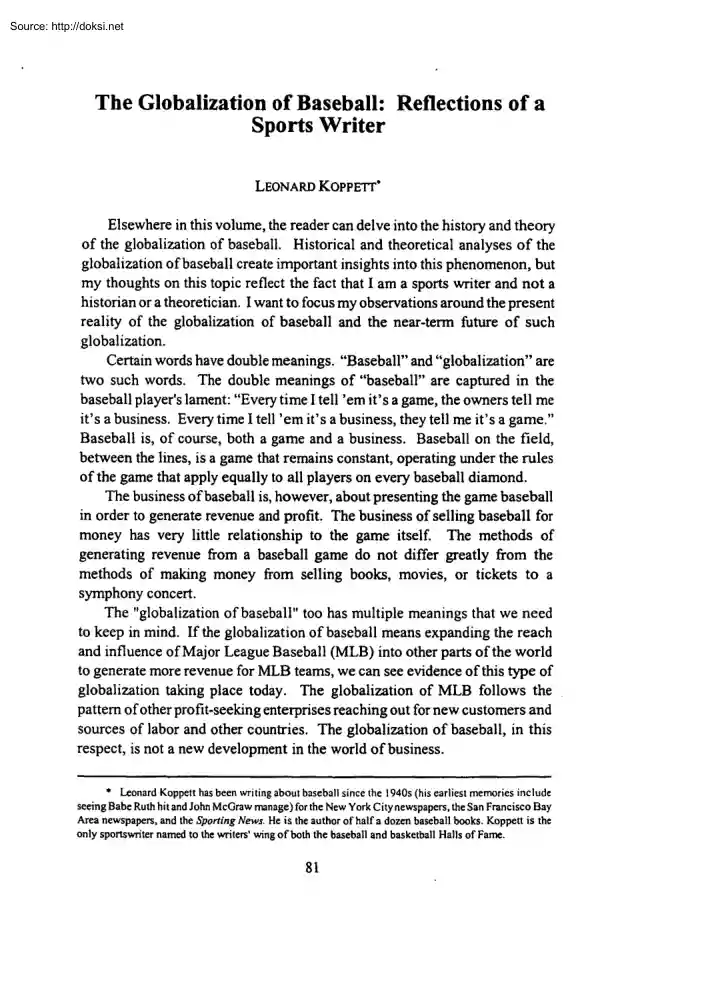
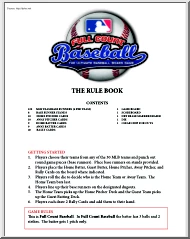
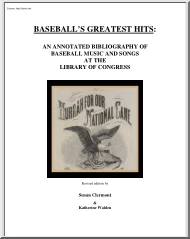
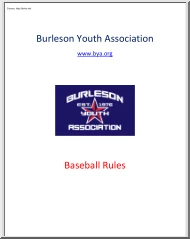
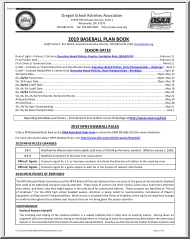
 When reading, most of us just let a story wash over us, getting lost in the world of the book rather than paying attention to the individual elements of the plot or writing. However, in English class, our teachers ask us to look at the mechanics of the writing.
When reading, most of us just let a story wash over us, getting lost in the world of the book rather than paying attention to the individual elements of the plot or writing. However, in English class, our teachers ask us to look at the mechanics of the writing.